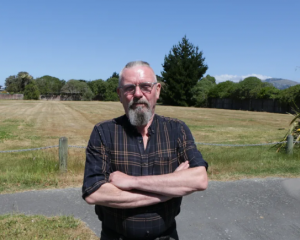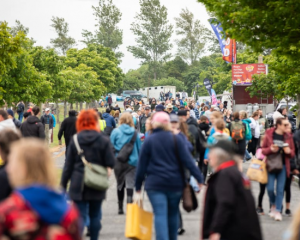
Exactly two years after the November 2021 fire at Bromley's wastewater treatment plant, the independent review of the council's response and recovery from the event was tabled at Wednesday's council meeting.
The Tregaskis Brown report released last month showed the council's response was substandard, particularly around addressing welfare concerns for affected residents.
Locals in Bromley and neighbouring parts have regularly complained about nausea, headaches, worsening asthma, sleepless nights and deteriorating mental health.
The problems are in addition to ongoing complaints about a separate odour linked to the nearby organics processing plant.
At Wednesday's council meeting, Mauger was one of several representatives who offered an apology, including chief executive Dawn Baxendale.
Mauger, who apologised multiple times, said Bromley had it tough for years.
"With the wastewater treatment plant, we had a bad response, as reiterated in the report. And I apologise, along with the council and the [chief executive] for that.
"The wastewater treatment plant was the straw that broke the camel's back and people out there have had enough."
The report, commissioned by council, said the authority had "poor or non-existent" relationships with affected residents.
"The seriousness of the situation wasn't acknowledged," the report said.
"The public communications showed little understanding of how bad the situation was getting - residents felt they were still trying to convince the council there was a problem."
Council also made mistakes in how it established its response and recovery teams during the immediate aftermath of the fire, the report said.
It stated council initially established a small incident management team, before a steering committee was set up a month later that "gave the impression this was a business as usual project".
'Fronting up is the only way'
The report recommends an incident management response to large-scale events and that the council strengthen ties to the communities of Bromley and other neighbouring suburbs.

"The extraordinary thing is that you could understand this happening in another city, perhaps one [that] had not experienced the decade of disaster that we had.
"Yet despite all of our discussions and learnings, we failed to do the basics when it mattered most."
Johanson believed the report highlighted environmental inequity in the east of the city, that was "adversely impacting people's quality of life".
"The irony is the pace of which problems around a rugby stadium for professional sports can be addressed is far quicker and nimbler than the pace of things in the east that are ruining people's lives on a daily basis."
The remarks garnered agreement and subsequent applause from a member of the public.
An eight-page draft improvement plan that recommended "strengthening relationships with the affected communities" was also presented at the meeting.
Fellow councillor Sam MacDonald was more even-handed in his comments, pointing out it was not council who started the fire on 1 November.

"I have a lot of public meetings and I have never experienced that level of anger from a community over that lack of communication.
"Fronting up is the only way you can deal with situations like this."
Deputy mayor Pauline Cotter said the review highlighted how pivotal community boards were in terms of public engagement.
Councillors Mark Peters, Tyla Harrison-Hunt, Kelly Barber and Celeste Donovan also spoke to the report during the meeting.
The council is continuing to negotiate a settlement with its insurer on the wastewater treatment plant.
Baxendale refused to comment on possible timeframes when asked by RNZ last week.













